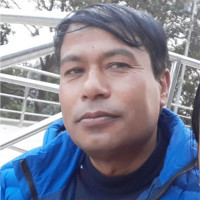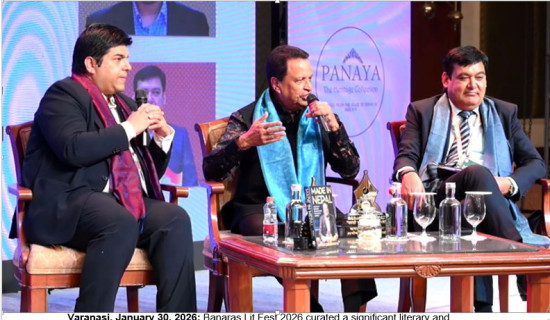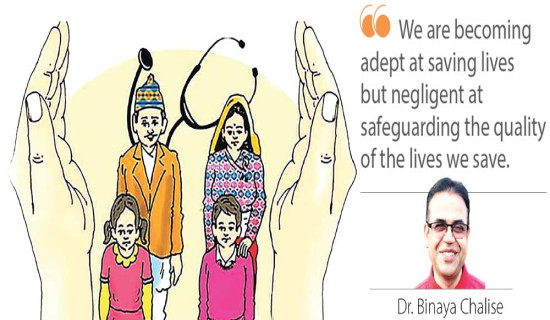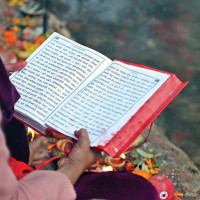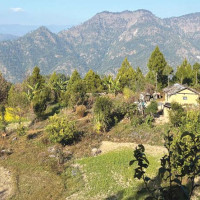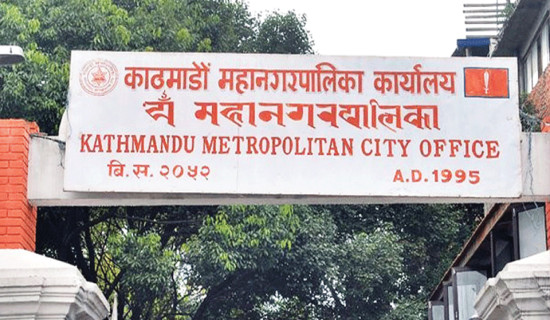- Saturday, 31 January 2026
FOSWAL Festival boosts SAARC literature
The enthusiasm among young Nepali writers to participate in
the FOSWAL Literature Festival
held in New Delhi in the second week of this November was palpable. This year,
I joined the festival with a lot of excitement. One of the main reasons for my
enthusiasm was the opportunity to meet Ajeet Cour, a celebrated Indian fiction
writer from Punjab who is the recipient of the Padma Shri and Sahitya Akademy
Awards. Reading her autobiographical short stories and memoirs has often left
me moved. I first saw her during a two-day SAARC fiction festival held in
Kathmandu in 2006. That event primarily featured fiction writers from Nepal and
India. I had seen her passionately
praising creations that touched her heart and intervening when speakers drifted
off-topic at the event. I still recall her commenting a rambling moderator back
then, “Dear terrorist, shall we stop this here?”
Last April, I received Ajeet Cour's email to participate in
the 65th FOSWAL Literature Festival. I was thrilled because many young Nepali
writers had already participated in this event, but I hadn't had the chance
before. Excitedly, I attended the event at the Academy of Fine Arts and
Literature in Siri Fort, New Delhi, from November 10 to 13, 2024. I enjoyed all
sessions except for the final day when participants other than Indians were
taken for sight seeing of historic sites in New Delhi. (Besides, I had chance
to meet many literary figures including KV Dominic, Bhupinder Kaur Preet, Gayatri
Majumdar, Faridur Rahman, Sushminder Jeet Kaur, Kavita Singhal and others.)
Ajeet has turned 90.
Despite her frail
physique compared to before, her unwavering dedication and enthusiasm for
promoting literature moved me deeply. Her habit of making encouraging feedbacks,
and, if touched by a piece, urging creators to share more of their work, remained
the same. Many authors from SAARC countries respectfully address her as
"Maa ji" (elder mother).
Though it was difficult for her
to remain seated at events for extended periods, her artist daughter Arpana
Cour frequently accompanied her to the sessions. Ajeet would listen to
presentations for a while and, in her resolute voice, offer inspiring
commentary, often requesting someone to share additional work. Soon, however,
she would need to leave for rest. November 16 marked her birthday, and on the
festival's final evening on 13th, a cake-cutting celebration was planned in her
honour. Unfortunately, she fell unwell and had to be rushed to the hospital.
Author of twenty-five
short story collections and eight novellas, the nonagenarian has
edited representative anthologies of stories, poems, essays, culture,
philosophy, and folk music from the SAARC countries in collaboration with
various individuals. Her persistent efforts and enthusiasm in organising FOSWAL
(Foundation OF SAARC Writers And
Literature) Literature Festivals,
despite the complicated political relations among some countries, have fostered
harmony among people of SAARC countries, evoking a deep sense of respect for
her remarkable contributions.
Nature
Conservation
There is no larger political
issue in the world today than nature conservation. Nations armed with weapons
for their false pride, and profit-driven tycoons for their greed, are piercing
the heart of the nature. This leads to massive carbon emissions and threatens
the very oxygen on which our lives depend. We are now reaping the consequences
of our actions, as well as those we did not take. This does not merely shorten
the lifespan of our beloved planet; it spells the impending doom of this
beautiful biosphere and the human civilisation. Writers worldwide must make
this a critical issue of their writing. The nonagenerain, in addition to being
an author, is also an advocate for nature conservation. This year’s festival
theme, “Heal the Wounds of Endangerd
World,” reflected her ideology. Consequently, at the festival’s
opening ceremony, alongside literary figures, notable contributors to
environment protection were honoured with the SAARC Environment Award. Those
included Sant Balbir Singh Seechewal, who played a transformative role in
cleaning Punjab’s rivers, as well as Vandana Shiva, Indian justice Vineet
Kothari and M.L. Lohoti, and conservationists Anil Sood and Kamal Kashyap. The
recipients of SAARC Literature Award included India’s Tara Gandhi
Bhattacharjee, Shehpar Rasool, Anamika, Vanita, and Arundhathi Subramaniam, Sri
Lanka’s Thameera Manju, and Nepal’s Bidhan Acharya.
Nepal's Representation
Among the seven participants from
Nepal, I was the only one included in the fiction session. Deputy Executive
Editor of The Rising Nepal daily, Rituraj Subedi, was assigned to present a
paper, while the rest joined the poetry session. Personally, I felt more
comfortable with poetry since I had translated poems in English, while I lacked
translated short stories. However, this brought upon me the eleventh hour
pressure to translate one of my own short stories. I chose the one titled 'The
Reporter." Some times ago, a news about a municipal employees
who hadn’t received salary for two months due to the absence of their
supervisor had gained media hype. However, the fact that most journalists in
the country go unpaid for five to six months rarely ever becomes a news story.
My short story narrated the tale of a journalist driven by the dual pressures
of securing his job and chasing a scoop. Then, he pens a sensational story
about a teenage girl cruelly killed in a car's strike, only to later discover
that the victim was his own sister.
During the 15-minute time limit
for the story presentation, I had to skip some parts and paragraphs of the story,
but I still remember the profound, somber silence of the audience as I read,
followed by empathetic and heartfelt remarks.
In his presetation, journalist
Subedi offered critical observation of a
novella Modiain by famous fiction writer BP Koirala in reference to play wright
Professor Abhi Subedi’s play Sandaju Ko
Mahabharat. He partcularly highlighted the ecological elements in
Modiain. Meanwhile, Bidhan Acharya, Chandra Gurung, Netra Atom, Naaz Singh, and
Sabita Gautam Dahal gave impactful poetry recitations. Acharya also presented a
paper in another session, where he introduced the term 'Himalayan Culture' to
describe the subcontinent's shared heritage, earning widespread praise for his
reasoning and perspective.
Although this year's event
primarily featured authors from Nepal, India, Bhutan, and Bangladesh, the
quality of the presentations made up for the absence of high-profile writers.
Bhutan’s Chador Wangmo, India’s Mysna Chanu and Swati Sharma, Sri Lanka’s Upul Guruge and
Chinthaka Ranasinghe, and Nepal’s Chandra Gurung, Sabita Gautam, Bangladesh's
Parveen Shehnaz and Jasmine Munni and others all managed to capture the
audience’s attention. Guruge, also a singer, became so popular that his singing
performances were repeatedly requested during breaks between sessions.
Distinctiveness
Of Sessions
Having attended several literary
festivals in Nepal and India, I observed unique differences in their approaches
to presentations. Big literary festivals in Nepal often treat poetry as 'filler
content.' A single poetry session might cram in 19–20 poets, with each given
time for only one short poem. Nevertheless, poetry sessions attract the largest
audiences. In contrast, at the Parallel Literary Festival, initiated a few
years ago in Jaipur of India and currently on hold, four or five poets would be
allocated an hour-long session. They could present their representative poems
and share thoughts about their work. The sessions at the FOSWAL festival had
their own distinctiveness. Over four days, 26 sessions were conducted. In the
poetry sessions, each poet was allotted eight minutes to present either three
short poems, or their thoughts about poetry. Fiction and research paper sessions,
however, allowed participants 15 minutes each. Fiction writers could read
excerpts from their stories or novels, while essayists or non-literary
participants could deliver speeches on their chosen topics.
What struck me as most
interesting was that every session had a designated chairperson. After each
presentation, the chairperson could extend the writer’s allotted time if
necessary and provide concise, immediate commentary on their creations. For
example, Arundhathi Subramaniam, an English-language poet from Mumbai and
winner of India’s Sahitya Academy Award, offered insightful critiques in her
melodious voice, often concluding with her own poetry. Similarly, celebrated
Hindi poet Anamika’s remarks were captivating, and audiences were even more eager
to listen to her poems. The sturcture of the sessions added immense value to
the recitals, making it highly engaging for both participants and attendees.
Conclusion
Reflecting on Nepal’s
participation in the FOSWAL festivals, I feel that there has been limited
representation of diverse voices from Nepali literature. Just because I
participated this time doesn’t mean everything was perfect. Regardless of who
attends—be it poets, fiction writers, or essayists—it is imperative that the
true essence of Nepali literature is reflected at such platforms. This should
remain our focus in the years ahead.
(Shrestha is a litterateur and freelance journalist.)


